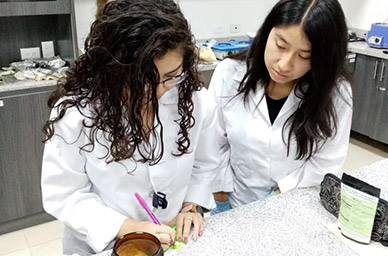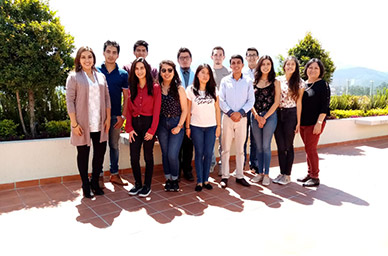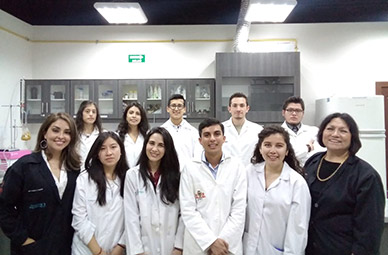RESEARCHERS
Lourdes M. Orejuela-Escobar
PhD, Virginia Polytechnic Institute and State University
Office: Newton, N 104-H
Phone: (+593 2) 297-1700, ext. 2074
E-mail: lorejuela@usfq.edu.ec

Interests
Research focused on promoting Circular Engineering and Bioeconomy and Sustainable Manufacturing through the application of Zero Waste Technology and Second Generation Biorefinery (recovery of forest, agricultural, agro-industrial and urban waste) and Third Generation (recovery microalgae), and through the use of Sustainable Processes and Green Chemistry; for the recovery of phytochemicals, biopolymers and other materials and their inclusion in high value-added bioproducts and advanced materials, such as essential oils, polyphenols, pigments, aromatic compounds, lipids, macro / micro / nanocellulose, hemicelluloses, lignins, pectins and proteins , for the paper, packaging, textile, food supplements, resins, paints, composite materials, filter membranes for air, water and soil purification and other environmental applications.
Projects
- Optimization and economic viability of the bioethanol/Biofuels production process from waste: Production of biofuels from renewable sources (waste from other industries as raw materials) as a sustainable alternative for energy generation, and the creation of other value-added products. The economic factor will be optimized ensuring its profitability, taking into account all its stages: pretreatment of raw materials, saccharification, fermentation and distillation to find operating conditions that maximize productivity and profitability. Operating conditions will be scaled up at the pilot plant level.
- BIOZERO-Renewable nanocellulose membrane for virus filtration in water: The waste management technology, together with environmentally friendly techniques, allows the generation of high added value chemical products that can be applied in different sectors of the industry. This project is focused on obtaining nanocellulose. Nanocellulose stands out from other materials for its high surface area, biocompatibility, and degradability, and allows its use in the removal of microorganisms as a membrane. This will result in a membrane that is low cost and competitive with the membranes on the market.
- Adsorption bed kinetics for organic and inorganic pollutants removal from water using lignocellulosic biomass and their recovery using deep eutectic solvents Fruit peels, moringa husk, walnut shells and biochar will be explored as filtering media to remove contaminants from artificial water. Biochar, or plant charcoal from pyrolyzed biomass, is an emerging filtering material due to its microstructure, surface area, carbon content, and easiness of manufacture. The contaminants to be explored are: an emerging organic compound – ibuprofen (or carbamacepine, or acesulfame or irgasan), hydrocarbons (from synthetic produced water), and a heavy metal (iron or lead).
- Fractionation of agro-industrial residues of cocoa shell (Theobroma Cacao) to obtain nanocellulose: Currently, agro-industrial waste does not enter the value chain due to ignorance of technological alternatives and the lack of investment for its processing, so it is burned or dumped in sanitary landfills, causing collateral damage to the environment. However, the use of waste has gained importance due to its availability, low cost, easy acquisition and high chemical content. Through chemical or biological transformation, these wastes can give rise to products with added value for a sustainable management of natural resources. The objective of this project is to valorise the residual biomass of the cocoa industry through its fractionation to obtain nanocellulose.
- Obtaining high added value compounds (cava) from residual lignocellulosic biomass for their potential use in industrial applications of encapsulated bioproducts: Apply concepts of green engineering, zero waste technology, bioeconomy, biorefinery and circular economy to obtain / recover high value-added chemical compounds. This project focuses on obtaining bioactive essential oils and natural colorants, extracted using state-of-the-art solvent technology such as Deep Eutectic Solvents (DESPs), for their subsequent encapsulation.
- Bioeconomy and biorefinery-tagua (Phytelephas aequatorialis): Fractionation by autohydrolysis and enzymatic hydrolysis to obtain bioproducts and biomaterials with potential uses in nutraceuticals. The tagua (Phytelephas aequatorialis) or vegetable ivory is an endemic species of Ecuador that grows in the coastal zone, which had its heyday with the export of buttons, after the Second World War. With the development of synthetic polymers, this industry encountered difficulties, which is why Ecuadorian handicrafts were produced. During the last five years, a demand for ground tagua has developed for the cosmetic and nutraceutical industry. The objective of this research is the study of the chemical composition of tagua and the development of a technology for its integral use by isolating its chemical components.
Publications
| Year | Title | Authors | Document |
|---|---|---|---|
| 2020 | Second Generation Biorefining in Ecuador: Circular Bioeconomy, Zero Waste Technology, Environment and Sustainable Development – The Nexus. Accepted for publication in the Journal of Bioresources and Bioproducts. | Orejuela, L. M., Landázuri, A. C., Goodell, B. | In process |
| 2020 | Hacia la sostenibilidad con la Bioeconomía y Biorrefinería de Subproductos Forestales y Agroindustriales Aplicando Química e Ingeniería Verdes | Orejuela, L.M. | Event Minutes, in process |
| 2020 | Moringa oleifera Lam. Leaf Powder Antioxidant Activity and Cytotoxicity in human primary fibroblasts. Natural Product Research | Landázuri, A. C., Gualle, A., Castañeda, E., Morales, Caicedo, A., Orejuela, L. | Download |
| 2020 | Part 2 Chapter Orange (Citrus sinensis): Phytochemicals, Phytonutrients, Antioxidant effects and metabolic benefits. In “Medicinal Plants in the Treatments of Metabolic Disorders”. | Orejuela, L.M., Arboleda, E. | Download |
| 2020 | Part 3 Chapter 2. Avocado (Persea americana): Phytochemicals and Health Promoting Benefits against Metabolic Disdorders. In “Medicinal Plants in the Treatment of Metabolic Disorders” | Orejuela, L.M. | Download |
| 2020 | Mango (Mangifera indica L.) By-Products for Food, Cosmetics and Water Treatment Applications: A Zero-Waste and Biorefinery Approach with Classic and New Generation Solvents. | Landázuri, A.C., Arroyo, E., Lagos, A.S., Gualle, A., Andino, C. and Orejuela, L. | 2020 AIChE Annual Meeting Conference Proceedings. November 2020. |
| 2020 | All for One and One for All Research: Moringa oleifera Lam. in Food, Health and Environmental Applications | Landázuri, A.C., Arroyo, E., Lagos, A.S., Gualle, A., Andino, C. and Orejuela, L. | 2020 AIChE Annual Meeting Conference Proceedings. November 2020. |
| 2019 | Valorización de residuos y subproductos agroindustriales mediante la biorefineria y su impacto en lla Bioeconomia y Economia Circular, in Ciclo de Conferencias: Ambiente y Residuos. ESPOCH, 5 de Dic 2019. Riobamba, Ecuador | Orejuela, L.M. | Download |
| 2019 | Biorefinery, Bioeconomy and Circular Economy in Ecuador: from forest and agroindustrial by-products to biofuels and high value-added chemicals | Orejuela, L.M. | Download |
| 2019 | Relación de la Economía Circular, la Tecnología Cero Desechos, la Bioeconomía, la Biorrefinería, y el Desarrollo Sostenible y Sustentable | Orejuela, L. M. | Download |
| 2019 | Biorefinery: Macro, micro and nanocellulose fibers from forest and agro-industrial waste | Orejuela, L. M. | Download |
| 2019 | Materiales Avanzados a partir de biomasa residual forestal, agrícola, agroindustrial y urbana | Orejuela, L. M. | Primer Congreso de Investigación en Materiales y Aplicaciones. Primer Congreso de Investigación en Materiales y Aplicaciones |
| 2019 | Bioproductos y materiales avanzados a partir de biomasa residual | Orejuela, L. M. | Universidad Técnica de Ambato, April 2019. Ambato, Ecuador |
| 2019 | Tecnología cero desperdicios y su impacto ambiental: Biorefineria lignocelulosica para obtención sustentable de bioenergía y productos de alto valor agregado | Orejuela, L. M. | XI Congreso Nacional de Estudiantes de Ingeniería Química USFQ. November 2018, Quito, Ecuador. |
| 2018 | Biorefinería : un modelo de negocios de productos de alto valor agregado a partir de desechos agrícolas e industriales y promotora de desarrollo sustentable en el contexto de la bioeconomía | Orejuela, L. M. | Download |
| 2018 | Uso eficiente de la biomasa residual: fraccionamiento para la obtención de biocombustibles y bioproductos en las Agro y Biorrefinerías | Orejuela, L. M. | Download |
| 2018 | Structural analysis of lignin fractions isolated from lignocellulosic biomass after choline chloride: glycerol deep eutectic solvent and chelator-mediated Fenton pretreatments | Orejuela, L. M., Frazier, C., Goodell, B., Renneckar, S | IV Congreso de Biotecnología y Biodiversidad y XV Foro del Banano, October 2018. Guayaquil, Ecuador. |
| 2018 | Catalytic Pretreatment and Cellulase Cocktail Mimics Brown Rot for Potential Biorefinery Applications | Goodell, B., Tabor, S., Orejuela, L., Contreras, Alfredsen, G., D., Jellison, J., Renneckar, S., Labbe, N. | LignoBiotech 2018, Symposium of Biotechnology Applied to Lignocelluloses. 29 August – 1 September, Helsinki, Finland. |
| 2017 | Lignocellulosic Biomass Fractionation by Glyceline Deep Eutectic Solvent and a Chelator Fenton System | Orejuela, L. M. | Download |
| 2016 | Lignocellulose deconstruction using a deep eutectic solvent and a chelator-mediated Fenton system for biofuels and bioproducts production | Orejuela, L. M. | 2nd International Congress of Biofuels and Bioenergy”. September 2016. Sao Paulo, Brasil. |
| 2016 | Biomass fractionation to produce biofuels | Orejuela, L. M. | 4th Bio Based Material Center Symposium, May 18th, 2018, Virginia Tech, Blacksburg, VA, USA. |
| 2015 | Biofuels and Biomaterials from biomass treated with Glyceline Deep Eutectic Solvent and CMF reaction | Orejuela, L. M. | 10th Energy Harvesting Workshop 2015. Blacksburg, VA, USA. |
| 2015 | Cell Wall Deconstruction with DES and CMF system | Orejuela, L. M. | MII Conferences and Poster Session, 2015. Blacksburg, VA, USA. |




